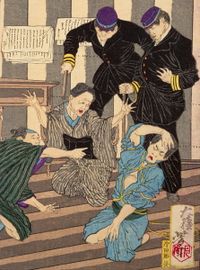Difference between revisions of "Hojojutsu"
From Nawapedia
Jump to navigationJump to search| Line 1: | Line 1: | ||
| + | {| align="right" | ||
| + | |- | ||
| + | |[[image:Hojojutsu1.jpg|200px|thumb|From Yubinhochi Shinbun 484. Art by [[Yoshitoshi Tsukioka]].]] | ||
| + | |- | ||
| + | |<div align="center"; width="200";>__TOC__</div> | ||
| + | |} | ||
<div style="text-align: justify;”> | <div style="text-align: justify;”> | ||
Hojojutsu is the Art of Rope Capture. Originally developed as a part of Jujutsu during the Warring States period of Japan, it was later adapted as a method to capture, restrain and control criminals during the Edo period. In the Meiji period, Hojojutsu was inherited by Metropolitan Police Departments. In the twentieth century, it has also provided great influence on the development of erotic SM play in Japan up until today. | Hojojutsu is the Art of Rope Capture. Originally developed as a part of Jujutsu during the Warring States period of Japan, it was later adapted as a method to capture, restrain and control criminals during the Edo period. In the Meiji period, Hojojutsu was inherited by Metropolitan Police Departments. In the twentieth century, it has also provided great influence on the development of erotic SM play in Japan up until today. | ||
Revision as of 14:39, 19 December 2020
 From Yubinhochi Shinbun 484. Art by Yoshitoshi Tsukioka. |
Hojojutsu is the Art of Rope Capture. Originally developed as a part of Jujutsu during the Warring States period of Japan, it was later adapted as a method to capture, restrain and control criminals during the Edo period. In the Meiji period, Hojojutsu was inherited by Metropolitan Police Departments. In the twentieth century, it has also provided great influence on the development of erotic SM play in Japan up until today.
Alternate Name(s)
捕縄術(Japanese), Hojojutsu, Torinawajutsu
History
Warring States Period (15th-17th centuries)
Edo Period (1603 - 1868)
Meiji Period (1868 - 1912)
20th Century
21st Century
References
Notes